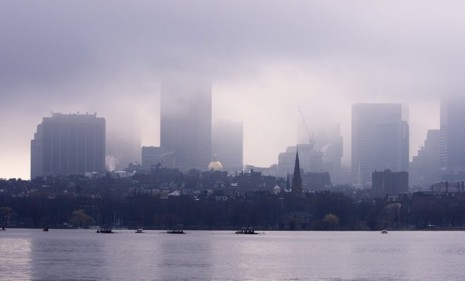Radioactive rain from Japan: Is Boston in danger?
Small amounts of radiation are found in rainwater from California to Massachusetts. Does it pose a health threat?

A free daily email with the biggest news stories of the day – and the best features from TheWeek.com
You are now subscribed
Your newsletter sign-up was successful
Trace levels of radiation have been detected in samples of rainwater in Boston. Researchers say it's almost certainly coming from Japan's Fukushima nuclear power plant, which was severely damaged by the 9.0-magnitude earthquake and tsunami earlier this month. Is the contamination bad enough to pose a health concern here in the U.S.? Here, a brief guide:
Just how radioactive is this rain?
Not very. Only trace amounts of radiation have been detected. Radiation from natural sources, such as the sun and uranium in rocks, can be 100,000 times higher. Plus, Massachusetts authorities didn't find radiation in the air near the spot where they detected radiation in rainwater. Tests by the Environmental Protection Agency have found radiation in rainwater at dozens of other testing sites — including in California and Nevada — but the levels there are also extremely low.
The Week
Escape your echo chamber. Get the facts behind the news, plus analysis from multiple perspectives.

Sign up for The Week's Free Newsletters
From our morning news briefing to a weekly Good News Newsletter, get the best of The Week delivered directly to your inbox.
From our morning news briefing to a weekly Good News Newsletter, get the best of The Week delivered directly to your inbox.
Does this pose a health risk?
No. "We're talking about many orders of magnitude below what we would consider a risk," says Nevada radiation physicist Eric Matus, as quoted in The Wall Street Journal. Massachusetts health authorities say kids can still play safely in the rain, pets can still drink rainwater, and people can continue eating vegetables from their gardens.
Could the danger rise if Japan's nuclear crisis gets worse?
Maybe a little, but not much. Scientists believe the radiation we're seeing now was probably emitted when Japan's crisis was at its worst. Iodine-131, the radioactive isotope detected in the rainwater samples, has a half-life of just eight days, so any current contamination will soon dissolve to an undetectable level. And a nuclear engineering professor at the Massachusetts Institute of Technology says that even if the Japanese plant experienced a complete meltdown, radioactive rainwater would be unlikely to pose a health threat in Massachusetts.
A free daily email with the biggest news stories of the day – and the best features from TheWeek.com
Are we even sure the radiation is coming from Japan?
Yes — scientists have little doubt the contamination drifted across the Pacific from Japan. Researchers at Case Western Reserve University in Ohio found trace amounts of iodine-131 that match what was leaked from the damaged Fukushima reactors. Indeed, the scientists were expecting radioactive rain from Japan, says Case Western professor Gerald Matisoff. "We knew that the weather pattern was bringing it in this direction."
Sources: Boston Globe, NBC News, Fox 8 Cleveland, Boston Herald, Wall Street Journal
-
 Will increasing tensions with Iran boil over into war?
Will increasing tensions with Iran boil over into war?Today’s Big Question President Donald Trump has recently been threatening the country
-
 Corruption: The spy sheikh and the president
Corruption: The spy sheikh and the presidentFeature Trump is at the center of another scandal
-
 Putin’s shadow war
Putin’s shadow warFeature The Kremlin is waging a campaign of sabotage and subversion against Ukraine’s allies in the West